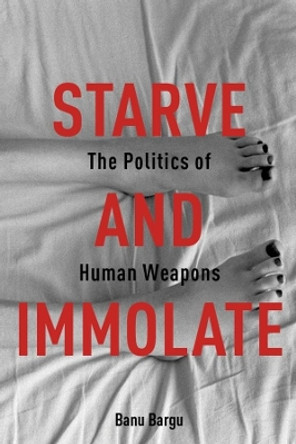Disembodiment examines self-destruction, self-injury, and self-endangerment as actions that express the injustices and indignities of the life conditions of impoverished, dispossessed, and dominated peoples. Author Banu Bargu troubles the dominant approach that treats these acts as individual pathologies, cries for help, and signs of despair. Instead, she suggests that they should be read as unconventional performances of resistance and refusal that are erased, marginalized, and distorted by metanarratives of history as progress and of agency as freedom and intentionality. Situating these practices in a dialectic of desubjectivation and counter-subjectivation, Bargu argues that they dispel a western metaphysics of subjecthood and invoke alternative ways of being human and of relating to one's body and the world. Pursuing philosophical questions about the meaning of agency, the direction of history, and the limits of the political generated by the forfeiture of the body, Bargu offers a stark and unforgiving critique of our present. As a work in global critical theory whose normative compass is the suffering body, Disembodiment brings together corporeal enactments of defiance and refusal from the global south with major thinkers of western modernity and prominent critical-theoretical traditions of the twentieth century. Bargu moves from such historical precedents as the suicides of enslaved Africans during the transatlantic crossing, the hunger strikes of woman suffragists in England's prisons, and Gandhian fasting practices in the Indian anticolonial struggle to contemporary examples that include the hunger and thirst strikes in the Maze and Guantanamo, the self-incineration of Mohammed Bouazizi, and the lip-sewing practices of migrants and asylum seekers in detention centers and border zones of the global north today. She takes the reader on an unsettling journey that delineates the emergence of a corporeal repertoire of contention. Performed by the powerless who find themselves in crisis, this repertoire is built on the expressive agency of the body and its ability to irrupt, undoing its training in composure and radicalizing the meaning of dignity. Disembodiment presents a bold materialist theory of corporeal agency, which upholds the body's powers as fundamentally rebellious and ultimately undomesticatable
About the AuthorBanu Bargu is Professor in History of Consciousness at University of California, Santa Cruz. Her research and publications are situated at the intersection of political and critical theory, anthropology, history of social movements and resistance practices, and Middle East politics. She is the author of Starve and Immolate: The Politics of Human Weapons, which received the First Book Award given by the Foundations of Political Theory section of the American Political Science Association and was named an Outstanding Academic Title by Choice. She is the incoming co-editor of Political Theory, the flagship journal of the field.
Book InformationISBN 9780197608531
Author Banu BarguFormat Hardback
Page Count 504
Imprint Oxford University Press IncPublisher Oxford University Press Inc
Weight(grams) 794g
Dimensions(mm) 241mm * 165mm * 46mm










